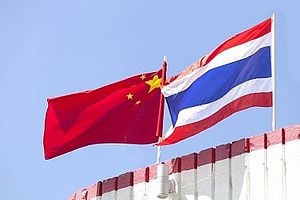The finalization of multi-billion dollar railway project between China and Thailand has been placed on hold due to outstanding disagreements, Thai media outlets reported on December 2.
The rail project, which has been proposed for years, would comprise two routes covering 867 kilometers and costing 350 billion baht ($9.7 billion), according to a draft cooperation framework approved in Thailand earlier this month. It has been hailed by both sides as a boost to their relationship as they commemorate the 40th anniversary of the establishment of diplomatic ties.
But on Tuesday, The Bangkok Post cited Thailand’s transport minister Arkhom Termpittayapaisith as saying that deputy prime minister Somkid Jatusripitak had placed a hold on the signing of a memorandum of cooperation after China failed to honor an associated pact on rubber that was part of a package deal initially reached last year.
Specifically, Arkhom said that China had asked to change a company that had been contracted to buy rubber from the Thai government and also attached a new condition where it would only purchase new rubber. Beijing, he said, had earlier agreed to buy from Thailand’s Mulaphan Kanchon rubber price intervention program, which includes both new and old rubber.
The disagreement is just the latest of many since plans for the rail project were announced last December during Chinese Premier Li Keqiang’s visit to Thailand alongside rice and rubber deals (See: “Thailand Turns to China”). Bangkok and Beijing have had differences over issues including funding, feasibility, and even the speed of the trains. In an interview to The Nation earlier this week, China’s ambassador to Thailand, Ning Fukui, acknowledged that disagreements still remained on issues like the interest rate and the financing of the project, even as he singled out the project as the most tangible demonstration of Sino-Thai cooperation since the start of his tenure in 2013.
Arkhom said that the three agreements – on rail, rice, and rubber – would be put on hold until Thailand and China can find common ground. While the project is expected to be approved once these issues are resolved, it is unclear how this will affect the proposed schedule, with a foundation stone laying ceremony initially planned for December 19 and construction scheduled to start as early as next May.
































